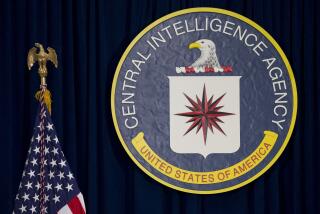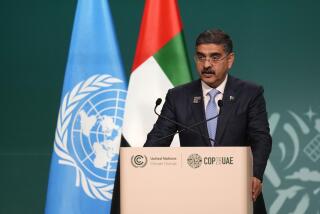Pakistan’s prime minister rejects backlash on Bin Laden
Reporting from Washington and Islamabad, Pakistan — In signs of worsening relations with Washington, Pakistan’s prime minister angrily rejected claims that collusion or incompetence allowed Osama bin Laden to hide near the Pakistani capital for years, and news media made public what they claim is the name of the top CIA agent in the country.
A private TV station and a right-wing newspaper with ties to Pakistan’s spy agency have each reported the name in recent days, marking the second time in six months that journalists here have sought to expose the local CIA station chief.
The U.S. and Pakistan have strongly criticized each other in the week since a team of Navy SEALs killed Bin Laden, although they say they intend to continue security cooperation.
U.S. officials have demanded an explanation of how Pakistan failed to find Bin Laden for more than five years in Abbottabad, a city with a heavy military presence that is close to Islamabad. The Pakistanis have complained that the U.S. raid was an infringement of their sovereignty and have called for a scaling back of U.S. counter-terrorism efforts in their country.
In a speech to parliament Monday, Prime Minister Yousuf Raza Gilani denied U.S. suggestions that the government harbored Bin Laden or was incompetent because it failed to track him down. Gilani vowed to find out how the terrorist leader was able to hide for so long, but he also lashed out at Washington for the raid.
A senior U.S. official said the United States was “committed to having this relationship continue and grow” and noted that despite some harsh words, Pakistani officials had not yet taken any steps to curb security cooperation.
But he added: “It’s going to be more difficult.... Some of this may be bombast for public consumption, but they certainly feel aggrieved by what’s happening and are struggling to figure out what’s next.” The official spoke on condition of anonymity because of the sensitivity of the topic.
U.S. officials said Monday that they expect Pakistan to allow them access to the three Bin Laden wives who were in the Al Qaeda leader’s compound at the time of the raid.
The CIA’s Islamabad station chief plays a key role in the country because of the agency’s use of drone aircraft to fire missiles at militants in the tribal areas along the Afghan border.
Another U.S. official who spoke on condition of anonymity said officials suspect the chief’s name was provided to Pakistani media by a government official. The U.S. official said the name might be a misspelled version of the correct name, which is classified information.
Officials of the Pakistani spy agency, the Inter-Services Intelligence directorate, work with the CIA on some missions and know the identities of senior officials, according to former CIA officials.
A U.S. official said there was “no current plan to bring the CIA station chief home.” In the previous case, in December, the intelligence official was brought back to the U.S. from Pakistan.
The White House and Pakistani officials declined to comment.
Paul Pillar, a CIA veteran now at Georgetown University, said disclosure of a station chief’s name would have limited effect on the agency’s operations, but it would affect “the overall tone of a relationship that has gotten pretty bad.”
“The spy war gets more personal and vicious every day,” said Bruce Riedel, a former CIA and Obama administration official now with the Brookings Institution.
Pakistan’s intelligence agency has cultivated strong ties with Pakistani journalists, who have published information intended to advance the ISI’s interests.
Mazhar Abbas, news director of ARY television, which first carried the report on the station chief, said in an interview that he did not ask his reporter what his source was “because I have confidence in him.”
“It was a juicy story, and all stories coming out about the CIA-ISI relationship are relevant,” Abbas said.
Since the Bin Laden raid, the Pakistani government and military have faced a deluge of criticism from citizens angry at the possibility that members of the security establishment knew — or should have known and didn’t — that Bin Laden was hiding in Pakistan. Even more galling is that U.S. military helicopters carried out the raid undetected by Pakistan’s air defenses.
Meanwhile, leaders in Washington have been pressuring Islamabad to ferret out the support network that enabled Bin Laden to operate in Abbottabad and determine whether it involved members of Pakistan’s intelligence community. CIA Director Leon Panetta told Time magazine last week that the CIA had ruled out informing Pakistan of the planned raid because of concerns that “they might alert the targets.”
Prime Minister Gilani said an investigation of Bin Laden’s sanctuary would be overseen by Lt. Gen. Javed Iqbal, the army’s adjutant general.
“We are determined to get to the bottom of how, when and why about [Bin Laden’s] presence in Abbottabad,” Gilani said.
He also sought to assure Pakistanis that the government would not tolerate a similar raid in the future.
“Pakistan reserves the right to retaliate with full force,” Gilani said. “No one should underestimate the resolve and capability of our nation and armed forces to defend our sacred homeland.”
Gilani characterized Bin Laden’s years of sanctuary in Pakistan as “an intelligence failure,” but he added that blame should be shared by the CIA and intelligence agencies around the world. He said Pakistan’s spy agency had captured at least 40 key Al Qaeda operatives, including Khalid Shaikh Mohammed, whom U.S. officials regard as the principal architect of the Sept. 11 attacks.
“Allegations of complicity or incompetence are absurd,” Gilani said. “We will not allow our detractors to succeed in offloading their own shortcomings … in a blame game that stigmatizes Pakistan.”
The aggressive tone of Gilani’s speech suggested growing concern about the toll the Bin Laden affair has taken on the country’s ruling Pakistan People’s Party, led by President Asif Ali Zardari.
Opposition parties have capitalized on the public’s discontent over the raid. Former Prime Minister Nawaz Sharif, leader of the main opposition party, PML-N, said Monday that the mission was “a blow to Pakistani sovereignty and self-respect.”
Last week, former Foreign Minister Shah Mehmood Qureshi, a member of Zardari’s party who lost his Cabinet post this year, called on both Zardari and Gilani to resign.
Daniel Markey, a South Asia specialist at the Council on Foreign Relations and a former State Department official, said Gilani’s speech had a number of goals, including defending the army so it wouldn’t turn on the ruling party and spreading some of the blame to the U.S.
Given the frustration in Congress and among ordinary Americans, he said, “even if we see this speech as posturing, it could dump more fuel on the fire. Crises escalate step by step at first, unless both sides choose to find a way out. I don’t see that yet.”
Richter reported from Washington and Rodriguez from Islamabad. Times staff writer Ken Dilanian in Washington contributed to this report.
More to Read
Sign up for Essential California
The most important California stories and recommendations in your inbox every morning.
You may occasionally receive promotional content from the Los Angeles Times.











